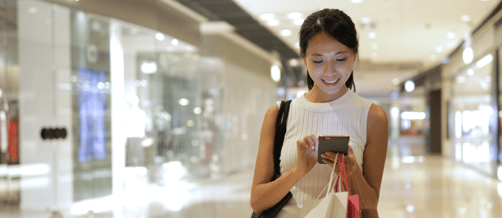
How WiFi Systems Have Impacted Local Communities | WiFi SPARK
The Guardian found that almost every town centre in England and Wales has declined since 2013. Rising inflation rates and the shift to online shopping are just...
Read more
4 minute read | 01/08/2018

Whatever you’re selling, you need to do everything you can to attract customers through your doors and keep them coming back after the sale. Smartphones and internet shopping have changed the way customers want to shop and altered their expectations.
To be successful, you’ll need to think about customer engagement and how you can use technology to stay ahead of the competition.
Customer engagement is the connection between the customer and you, the brand. It’s an emotional connection that is vital to the success of your business. Customers who are highly engaged are more likely to buy products, recommend you to their friends and be loyal to your store over your competitors.
Gallup found that stores with a high level of customer engagement take 23 percent more revenue than the average. Customers are likely to be engaged if they believe that you always deliver. They’ll feel proud to be your customer and be confident that you’re perfect for their needs.
Some retailers have been quick to adopt new features and technologies that will improve customer retention, engagement and experience. Loyalty reward apps and click and collect are just two of the innovations that shoppers have embraced over recent years.
These were minor changes when compared to what’s coming next. Retailers are actively looking for ways to implement customer engagement technologies in their stores. Here are some of the changes we’ll start to see.
Customers will be encouraged to take photos of items they like whilst browsing inside the store. Powered by AI advancements, an app will then display or recommend similar items that it thinks the customer will also be interested in.
Not every shop assistant has the skills and knowledge to recommend clothing to shoppers and many consumers prefer to not be disturbed by staff. This AI-assisted visual search can turn a browse into a sale.
The line between an online and physical store is blurring. Customers expect a seamless online to offline experience when shopping. They should be able to quickly and easily order an item online if the physical store is out of stock.
Conversely, customers might be shopping on their smartphones and want to pick up an item they’ve researched or ordered online. They should be able to quickly reserve the product online, walk into the store and have their order ready in no time at all.
Augmented reality changing rooms have been available for a while but they’re yet to be fully adopted by retailers. They work by superimposing the clothing onto a live feed of the customer. It tracks the movement of the customer so it appears as though they’re actually wearing it.
This allows the customer to see if they’d like the clothing without even trying it on. They can browse hundreds of items with a 360 degree view to see which ones they’d most like to actually try on.
Most big retailers already offer bespoke apps and loyalty schemes to encourage repeat business. Retailers can use these apps to start to offer a personalised shopping experience when they’re in the store.
Apps can be set to send personalised promotional messages when consumers arrive or offer a bespoke product range that’s been put together through past purchase information.
An innovation that’s available immediately for retailers is bespoke WiFi. Customers are able to login to your store’s or shopping centre’s WiFi, allowing them to browse the web and use social media whilst inside.
Only 25 percent of retailers said that their in-store IT allowed them to improve customer experience. WiFi isn’t new by any means and consumers now expect WiFi at train stations, football stadiums and restaurants. But this is far more advanced than the WiFi you might be used to.
Today’s cutting edge platforms allow retailers to collect and analyse vital data that they can use to enhance customer engagement. This could be visitor data, customer interest, dwell, engagement and loyalty. As well as data out, you can also feed data into analytics such as weather, transport information, social media and more allowing you to make changes based on smart insights to boost sales.
For example, are shoppers more likely to spend more time in a particular part of your shop if certain music is playing or if it’s raining outside? You can see this data in real-time and make immediate adjustments.
You’re able to learn customer behaviours and spot patterns that help you to improve sales. For example, where have shoppers who leave without purchasing gone in the shopping centre instead? How can you change your offering to entice them to purchase from you?
For more information on bespoke retail WiFi and how it can help your store or centre, download our case study. We offer custom solutions, taking the time to understand your store or shopping centre’s requirements. Click the link below to view our case study and see how we can help.
Rebecca is the Marketing Director. She's worked for SPARK TSL since 2012. She is responsible for high level marketing strategy focusing on lead generation and aiding the vision of the business; to ensure that no patient has to pay for entertainment.
More articles by the author

The Guardian found that almost every town centre in England and Wales has declined since 2013. Rising inflation rates and the shift to online shopping are just...
Read more

Retail stores that offer WiFi are popular with shoppers and are an easy way of standing out from the competition. But just because there’s WiFi in a retail...
Read more

WiFi is not just for your IT department to concern themselves with. In the marketing team, you should be using your WiFi to promote your brand. With nine...
Read more